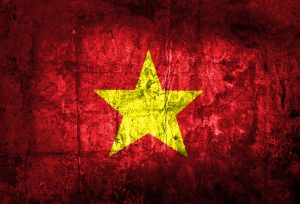Movements are made up of people who have chosen to join together to work toward a better world for people. Hoang Thi Minh Hong is one of those people – a dedicated and fearless climate defender whose contributions to climate justice globally, and in her home country of Vietnam, are vital. In the face of our planet’s most pressing crisis, climate defenders are the bravest among us. They have put their safety on the line to ensure a safe and just collective future for us all.
From raising awareness to advocating for policy change, and challenging the destructive practices that threaten our planet’s delicate balance, Hong’s work has been instrumental in both the global movement and in her country of birth, Vietnam, where she is currently detained. She was detained by Vietnamese police on May 31, on false charges of tax evasion, a tactic that is often used against critics of its environmental policy. She currently faces up to seven years in prison.
Vietnam is one of the top five countries likely to be most affected by climate change. In May this year, just weeks before Hong’s arrest, the country experienced its hottest day on record.
In December 2022, Vietnam became the third recipient of a $15.5 billion Just Energy Transition Partnership (JETP) agreement that aims to assist the country in phasing out coal and achieving net zero carbon emissions by 2050.
To ensure the success and fairness of energy transitions, it is imperative that JETPs incorporate comprehensive protection measures for people like Hong. While financial deals that assist low and middle income countries to leapfrog dirty development and embrace clean energy systems are vital, a just transition is only possible when civil society is able to meaningfully participate in the design and monitoring of any deals, including critique of policies, without fear of persecution.
As a heavily climate-impacted country and emerging economy, Vietnam has an instrumental role to play in ensuring a just, equitable response to climate change. But this cannot happen with climate leaders like Hong in jail. The country’s bold climate ambitions are the result of the hard work of climate defenders such as Hong.
To uphold the principles of a just transition, JETPs must include concrete protection measures for climate defenders. These mechanisms should include legal safeguards, such as the recognition of environmental rights, and the prosecution of perpetrators of violence. Additionally, early warning systems, emergency response mechanisms, and effective investigation processes are crucial to deter attacks and hold accountable those who seek to silence climate defenders. Collaborative efforts between governments, civil society organizations, and the private sector are essential in establishing safe spaces for dialogue, sharing knowledge, and supporting defenders’ physical and mental well-being.
But responsibility to protect climate defenders rests not only with national governments but also with the international community. We call on the nations involved in Vietnam’s energy deal to ensure the rights of all are upheld in its implementation.
What kind of world do we want to live in? The climate justice movement is committed to bringing about a world that is safe, just, abundant, and peaceful. We can’t do this without ensuring that activists like Hong are not only protected, but celebrated, supported, and free.

































